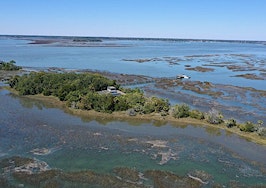In the peak of the spring homebuying season, real estate agents and their buyers were frantically bidding on homes with low hopes for success, as inventory remained tight and it seemed like everyone — and their brother — was ready to move into a new home.
But now that summer is here, a sea-change may be in effect for the market. Agents Inman spoke with said things seem to be less chaotic than a few weeks ago, as more inventory comes to market and vaccinated individuals and their families resume more normal leisure activities and take vacations.

Mony Ty | Coldwell Banker
“When I spoke with you [in March], I would list a property on Tuesday, by Friday it was under contract with multiple offers,” Mony Ty, an agent with Coldwell Banker, told Inman. “I think the market’s slowed down a little bit here in Salt Lake. Inventory — there’s a lot more homes on the market now, so I think, definitely, the last two months we’ve seen a little slowdown.”
A report released by Redfin on Thursday suggested that the market may have hit a peak in June, as home prices and pace of sales hit new records while seasonally adjusted home sales saw their steepest late-spring decline since Redfin started tracking the data in 2012.
On top of that, existing-home sales dropped for the fourth consecutive month in May, according to the National Association of Realtors. Likewise, Realtor.com’s Monthly Housing Report showed the number of new listings increased 11 percent between May and June, which was also up 5.5 percent from the previous year. All of which is to say, it looks like the market may be normalizing a bit.
The agents Inman spoke with said that they were still busy, and properties continue to move quickly in lower price points, but many also said that the high-end luxury market is slowing down.

Tom Deutsch, Jr. | Credit: Coldwell Banker
“I am seeing a little bit of a shift in the market,” Tom Deutsch, Jr., and agent with Coldwell Banker in Cincinnati, told Inman. “Things are not selling like they were 45-60 days ago. Certain price points are still selling, and they’re getting into multiple offers and selling, in those cases, for more than asking price, but it’s primarily, what I’m seeing, in the lower price point. I’m not seeing feeding frenzy quite as much in the higher-end inventory.”
That slow-down trend in higher-end properties is likely due to more of those properties coming to market now, according to data from realtor.com, as reported by The Wall Street Journal. During the week ending June 19, new listings priced over $1 million increased 17.5 percent year over year, but listings below $350,000 were down 7.4 percent.
The reemergence of institutional investors into the marketplace in recent weeks has also contributed to fewer lower-priced homes being available (which these investors tend to snatch up) and comparatively more high-priced homes occupying the marketplace.
“Your lower price point really doesn’t exist still,” Ty said. “They’re still very competitive in the lower price point. But, the higher price point I think it seems to [have slowed] down a bit.”

Jeff Marples | Credit: Marker Luxury Properties
Likewise, even in pricier markets like San Francisco that have been slow to recover from the pandemic in general, agents are seeing similar trends — more affordable properties are now moving quickly as people gain more confidence in city life again, but the high-end properties are lingering on the market much longer.
“Single-family homes are crazy, especially around that $1.5-$2 million market, [it’s] pretty competitive,” Jeff Marples, managing broker at Marker Luxury Properties in San Francisco, told Inman. “High-end luxury condos [are] slower, clearly, to sell. I think that most of the action I have had is $1.5 million and less.”
David DeSantis, a managing broker at TTR Sotheby’s International Realty, said that just within the past week, his firm’s new contract numbers declined by about a third. “So it could be a slowdown,” he said.
He said that with more people now vaccinated, they’re ready to take a real vacation — and aren’t thinking about real estate.

David DeSantis | Credit: TTR Sotheby’s International Realty
“A lot of people are vaccinated and feeling more like they can get out in the world,” DeSantis said. “People are so desperate to go on vacation that it was kind of my hunch that at least the latter half of July and August in D.C. would slow down considerably.”
DeSantis added that last summer was quite the opposite — the firm was incredibly busy, as shutdowns were still active in many places and people were scrambling to find a home in which to shelter in place.
“Whether they’re going abroad, or just to the lake, or their grandmother’s house, I think people are wanting to get a little time away, and that seems to be — one week of data is premature to say — but my hunch is that that’s going to continue.”













